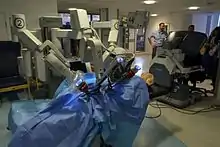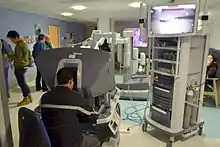da Vinci Surgical System
The da Vinci Surgical System is a robotic surgical system that uses a minimally invasive surgical approach. The system is manufactured by the company Intuitive Surgical. The system is used for prostatectomies, increasingly for cardiac valve repair and for renal[1] and gynecologic surgical procedures.[2][3]
 da Vinci Surgical System | |
| Manufacturer | Intuitive Surgical |
|---|---|
| Country | United States |
| Year of creation | 2000 (initial FDA clearance) |
| Type | Medical |
| Purpose | Medical |
| Website | https://www.intuitive.com |
It was used in an estimated 200,000 surgeries in 2012, most commonly for hysterectomies and prostate removals.[4] The system is called "da Vinci" in part because Leonardo da Vinci's study of human anatomy eventually led to the design of the first known robot in history.[5]
Medical uses
The system has been used in the following procedures:
- Radical prostatectomy, pyeloplasty, cystectomy, nephrectomy and ureteral reimplantation;
- Hysterectomy, myomectomy and sacrocolpopexy;
- Hiatal hernia and inguinal hernia repair;
- GI surgeries including resections and cholecystectomy;
- Transoral robotic surgery (TORS) for head and neck cancer;
- Lung transplantation, the da Vinci System has been used in the world's first fully robotic surgery of this kind thanks to a pioneering technique.[6]
Device


The da Vinci System consists of a surgeon's console that is typically in the same room as the patient, and a patient-side cart with three to four interactive robotic arms (depending on the model) controlled from the console. The arms hold objects, and can act as scalpels, scissors, bovies, or graspers. The final arm controls the 3D cameras.[7] The surgeon uses the controls of the console to manoeuvre the patient-side cart's robotic arms. The system always requires a human operator.
FDA clearance
The Food and Drug Administration (FDA) cleared the da Vinci Surgical System in 2000 for adult and pediatric use in urologic surgical procedures, general laparoscopic surgical procedures, gynecologic laparoscopic surgical procedures, general non-cardiovascular thoracoscopic surgical procedures, and thoracoscopically assisted cardiotomy procedures.
Criticism
While the use of robotic surgery has become an item in the advertisement of medical services, there is a lack of studies that indicate long-term results are superior to results following laparoscopic surgery.[8] Critics of robotic surgery assert that it is difficult for users to learn.[3] The da Vinci system uses proprietary software, which cannot be modified by physicians, thereby limiting the freedom to modify the operating system.[4] The system has a cost of $2 million which places it beyond the reach of many institutions.[9]
The manufacturer of the system, Intuitive Surgical, has been criticized for short-cutting FDA approval by a process known as premarket notification instead of entering the market through the 510(k) process. The company has also been accused of providing inadequate training and encouraging healthcare providers to reduce the number of supervised procedures required before a doctor is allowed to use the system without supervision.[10]
There have also been claims of patient injuries caused by stray electrical currents released from inappropriate parts of the surgical tips used by the system. Intuitive Surgical counter this argument by saying the same type of stray currents can occur in non-robotic laparoscopic procedures.[11] A study published in the Journal of the American Medical Association found that side effects and blood loss in robotically-performed hysterectomies are no better than those performed by traditional surgery, despite the significantly greater cost of the system.[12][13] As of 2013, the FDA was investigating problems with the da Vinci robot, including deaths during surgeries that used the device; a number of related lawsuits were also underway.[14]
See also
- ZEUS, a robotic surgical system (discontinued in 2003).
- Sina Surgical System, iranian surgical system
References
- Fatima, Sakina (19 May 2022). "da Vinci Xi surgical robot perform kidney surgery in Dubai". The Siasat Daily. Retrieved 19 May 2022.
A group of surgeons and Da Vinci Xi surgical robot in Dubai have performed a surgery on a Emirati patient who was suffering from a blockage in the upper part of the ureter,
- "Robots as surgical enablers". MarketWatch. 3 February 2005. Retrieved 17 March 2013.
- "Prepping Robots to Perform Surgery". The New York Times. 4 May 2008. Retrieved 17 March 2013.
- Babbage Science and technology (18 January 2012). "Surgical robots: The kindness of strangers". The Economist. Retrieved 21 February 2013.
- "Company – Past Present Future". Intuitive Surgical. Retrieved 14 January 2015.
- "Vall d'Hebron achieves the first fully robotic lung transplant with a new access route". Vall d'Hebron Barcelona Hospital Campus. Retrieved 17 April 2023.
- "How the da Vinci Si Works". NYU Langone Health.
- Gina Kolata (13 February 2010). "Results Unproven, Robotic Surgery Wins Converts". The New York Times. Retrieved 11 March 2010.
- "The Slow Rise of the Robot Surgeon". MIT Technology Review. 24 March 2010. Retrieved 23 March 2013.
- "Salesmen in the Surgical Suite". The New York Times. 25 March 2013. Retrieved 24 April 2013.
- "Patients Scarred After Robotic Surgery". CNBC. 19 April 2013. Retrieved 24 April 2013.
- "Questions About Robotic Hysterectomy". The New York Times. 25 February 2013. Retrieved 24 April 2013.
- Wright, Jason (20 February 2013). "Robotically Assisted vs Laparoscopic Hysterectomy Among Women With Benign Gynecologic Disease". The Journal of the American Medical Association. 309 (7): 689–98. doi:10.1001/jama.2013.186. PMID 23423414.
- "da Vinci Robot Allegedly Marketed to Less-Skilled Doctors". LawyersandSettlements.com. 23 April 2013. Retrieved 24 April 2013.
External links
- Intuitive – da Vinci – Robotic Surgical Systems
- "Live robotic da Vinci radical prostatectomy during EAU congress" on YouTube by European Urological Association.